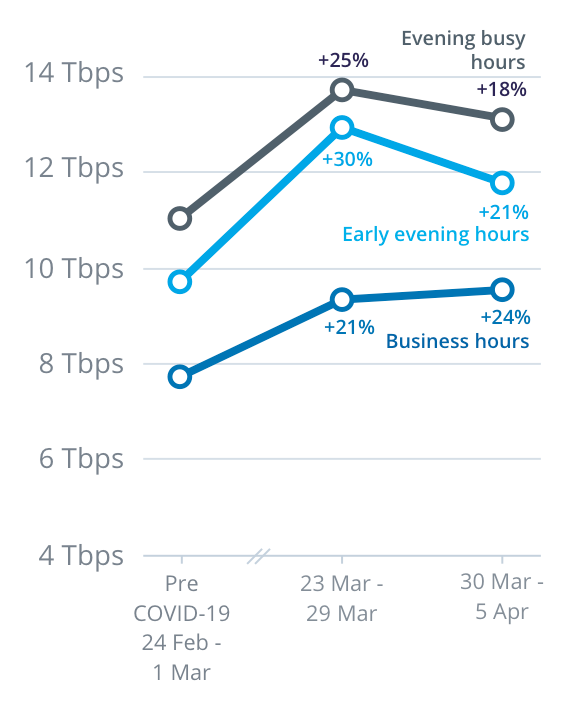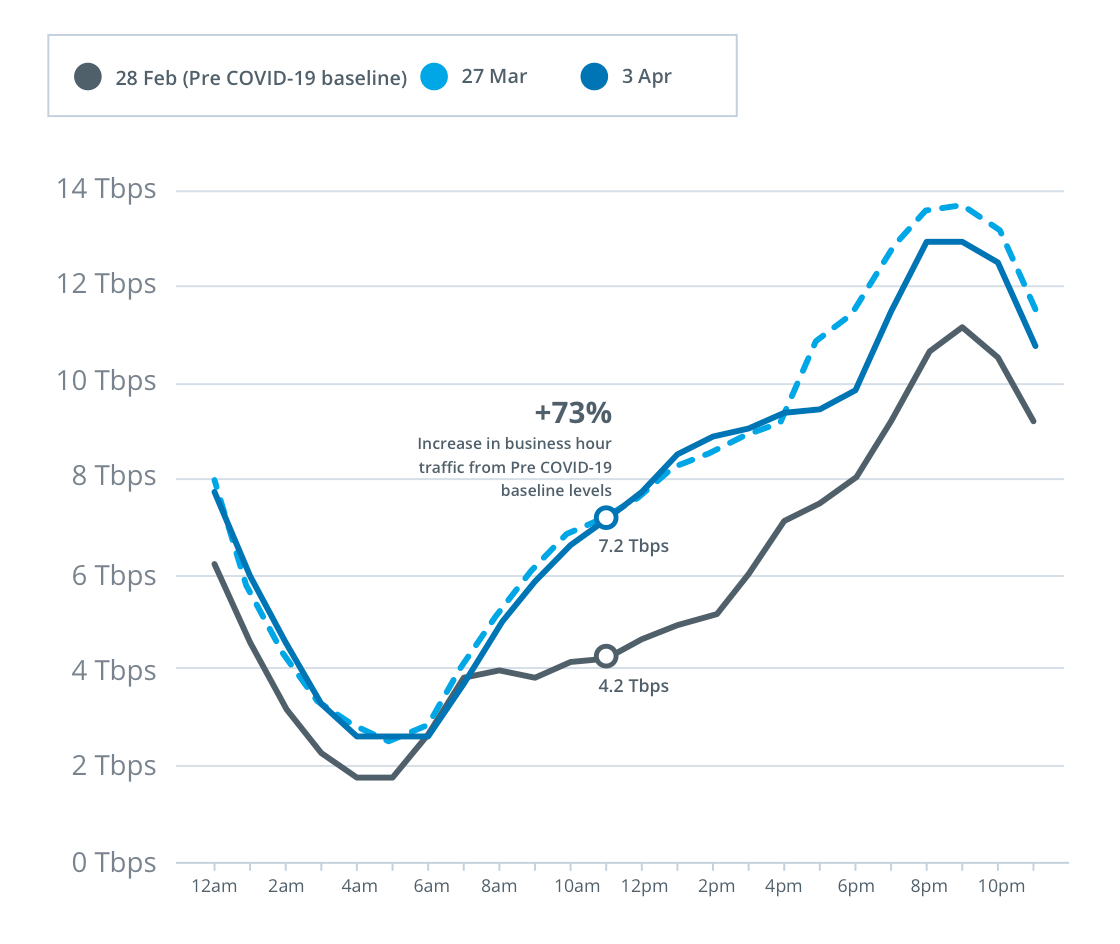Australian Broadband Data Demand: data demand during business hours continues to climb
Data demand during daytime business hours has continued to grow for nbn's main wholesale access service, as more Australians continue to self-isolate and shift their work, education and entertainment needs online.
For the week from Monday 30 March to Sunday 5 April, peak download throughput (the measure of data flowing through the nbn™ access network) during daytime business hours, increased by 24 per cent to 9.6 terabits per second (Tbps) compared to the last week of February (which nbn measures as its normal pre-COVID-19 baseline).
“As more Australians work and study from home, we are starting to see network demand settle into a new range where network usage remains at higher levels throughout the day, compared to what we were seeing before self-isolation and social distancing measures were implemented,” said Brad Whitcomb, Chief Customer Officer – Residential at NBN Co.
“However, while the peak throughput recorded in the daytime business hours continues to grow, it still remains well below the peak throughput recorded in the busy evening period when the data throughput on the main wholesale service is at its highest. These peaks also remain well within nbn’s core capacity capability.”
Even though data demand during the early evening and busy evening hours continues to be significantly higher than the pre-COVID-19 baseline, it is only peak throughput during the daytime business hours that has grown since last week. Peak throughput recorded during business hours increased 6 per cent from the 9Tbps throughput peak that was recorded in the same time period for the week beginning 23 March.


The new figures are revealed in the latest release of Australian Broadband Data Demand, a weekly report from nbn that shows the highest throughput recorded in a week during each of the following three periods: the daytime business hours, early evening hours and busy evening hours.
Compared to that pre COVID-19 period, peak download throughput on the main wholesale service in the evening busy hours increased by 18 per cent to 13.1 (Tbps) for the week beginning 30 March. This was down from the peak data throughput of 13.8Tbps for the week beginning 23 March. That peak was recorded on the night of Friday, 27 March and coincided with an update to the popular video game Call of Duty.
The peak download throughput on the main wholesale service recorded in the early evening hours for the week beginning 30 March increased 21 per cent to 11.8Tbps, compared to the pre-COVID-19 baseline. This was also down from the previous week’s 12.8Tbps peak throughput measure that was recorded in the same time period.
The increases in download peaks since the last week of February, comes as NBN Co continues to see strong demand for new connections. Over the past two weeks, more than 40,000 activation orders have been placed NBN Co as more Australians shift their work and educational needs to their home broadband services.
“We have seen a significant increase in higher speed orders as more Australians look to support the internet needs of their families and households who rely on fast, reliable broadband to now study, work and play,” Mr Whitcomb said.
“It’s important to remember that the acquisition of capacity by internet providers is crucially important for nbn residential and business customers to maintain access to reliable, high-speed broadband. To assist, nbn announced on 18 March 2020 that it would waive charges for additional capacity of up to 40 per cent to internet providers for at least three months".
“Retail broadband plans based on wholesale speed tiers of 50Mbps and above continue to make up the bulk of our orders, and we have recently seen a significant increase in demand for retail plans based on the 100Mbps wholesale speed tier, which currently account for more than 16 percent of all new orders.”
The Australian Broadband Data Demand report is updated weekly on nbn’s Transparency dashboard at: www.nbn.com.au/updates
For tips on how to make the most of your nbn connection and to learn more on what NBN Co is doing to support Australia through COVID-19, please visit: www.nbnco.com.au/campaigns/covid-19
Notes to editor:
- These metrics represent the throughput peak each week, across the following three distinct periods:
o Business hours - Monday to Friday 8am to 4:59pm
o Early evening hours - Monday to Sunday 5pm to 7:59pm
o Evening busy hours - Monday to Sunday 8pm to 11:59pm
- For Business Hours, the peak is determined by taking the highest downstream throughput for our TC-4 service from the busiest 15 minute increment between Monday to Friday. The Early Evening Hours and Busy Evening Hours figures are recorded using the same methodology, but over a seven day period.
- TC-4 is nbn’s standard wholesale broadband service that is designed primarily for general internet and standard data services across all access technologies.
- NBN Co considers the throughput peak metric for our TC-4 service as the most appropriate measure for growth in data flowing through the network as it shows when network use is at its highest in each defined period in a week for our wholesale access service most used for residential broadband services.
- This second graph shows TC-4 usage (measured in terabits per second) over a 24 hour period on the dates shown in the key, and compares it the results from those two dates against a corresponding 24 hour period from nbn’s pre-COVID-19 baseline on 28 February 2020 (the last week of February). Each marker on the x axis represents an hour period in the day. The throughput measure (represented on the y axis) for each of the 60 minute periods in that 24 hours periods is calculated by recording the highest downstream throughput for our TC-4 service from the busiest 15 minute increment in that 60 minute period.
